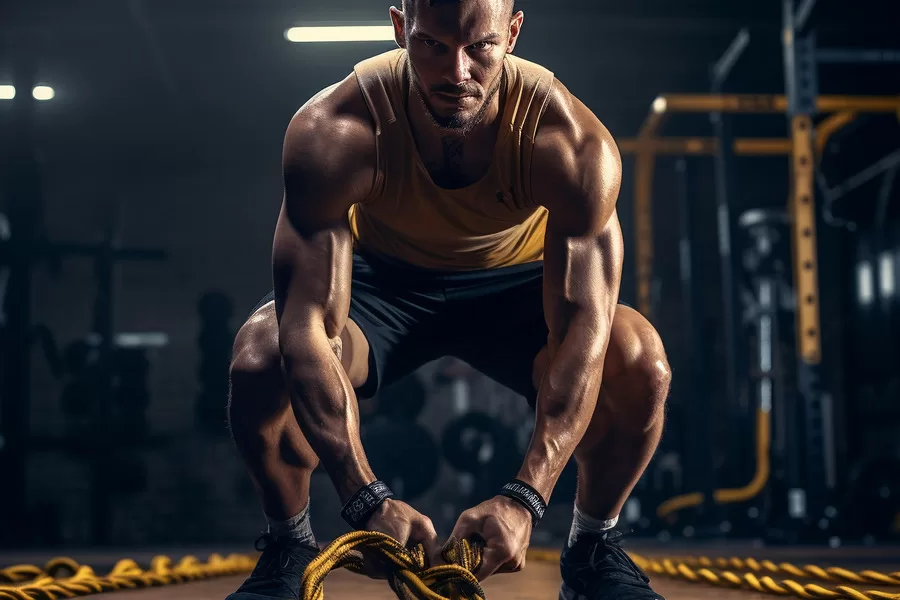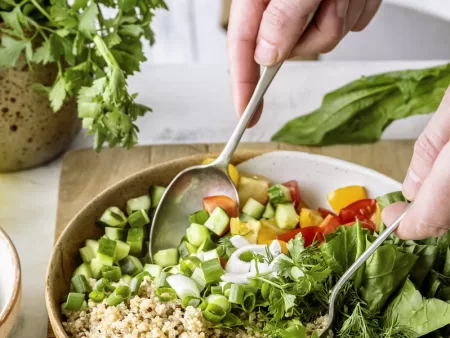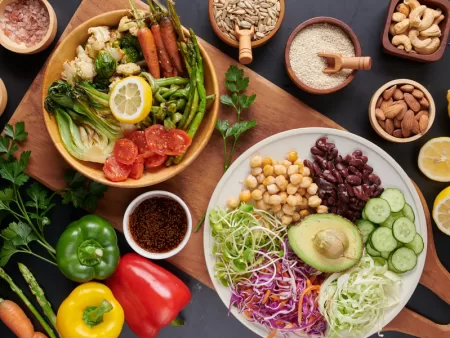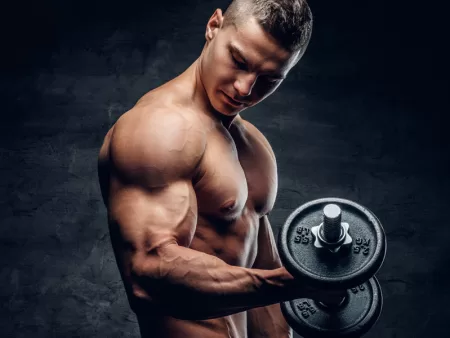
Do you play sports and see significant results? Most likely it’s gaining muscle mass, which means you’re doing everything right. What other signs of weight gain are there?
Simplified about Muscle Growth
What Happens When Muscles Grow?
When you’re pushing or lifting weights, your muscles go through a bit of stress. This stress causes small changes called ‘micro-tears.’ It’s a normal and healthy reaction. Your body then repairs these tears and, in the process, makes you a little stronger and bigger each time. This is why after regular workouts you notice that you can do more or lift heavier – your body has adapted and grown!
Slow and Fast: The Two Types
In your body, there are mainly two types of muscle fibers: slow-twitch and fast-twitch. Slow-twitch fibers are like endurance athletes, great for long runs or cycling. The fast-twitch fibers are your body’s sprinters; they’re all about quick, powerful bursts but get tired quickly. Different exercises target these different fibers, helping you build a balanced and functional body.
Exercise: The Key to Growth
Knowing about the two types of fibers, you can plan your workouts better. For a leaner body, focus on endurance exercises that engage your slow-twitch fibers. If you want explosive power and a larger body, incorporate more high-intensity exercises with short bursts to recruit these fast-twitch fibers. Variety in your workout is key to well-rounded muscle growth.
Don’t Forget Rest and Food
Exercise is the work, but without rest and the right nutrients, the building doesn’t happen. Rest allows you to recover and grow. Eating well, especially protein and healthy foods, gives your body the materials it needs to build a strong body. So, remember to take those rest days seriously and eat well to fuel your growth!
How to Tell When You’re Building Muscle
Strength Revolution
When your muscles grow, the first thing you’ll likely notice is you’re getting stronger. Maybe you’re carrying groceries more easily, or those weights at the gym don’t seem as heavy. This increase in your ability to lift and move things is a surefire sign of growth.
As muscles increase in size, they start to give your body a more defined look. You might notice certain areas becoming tighter and shapelier. This isn’t about getting bulky; it’s about the natural shape and tone that come with healthy growth.
Sizeable Achievements
Watching your muscles grow in size can be one of the most rewarding aspects of working out. It’s a gradual process, but over time, you’ll notice a significant increase in muscle mass, especially in the areas you’re targeting with your exercises.
Scale Surprises
As you build muscle, the number on the scale might not drop as you expect. In fact, it might go up! Muscle is denser than fat, so when you replace fat with it, your weight may stay the same or even increase while your body becomes leaner and stronger.
Recovery and Resilience
As your muscles get used to being worked out, they recover faster from each session. If you notice that you’re not as sore as you used to be or that you’re ready to hit the gym again sooner, it’s a good sign your muscles are growing and adapting.
Everyone’s body reacts differently, so your signs of muscle gains might be slightly different or come in a different order. What’s important is to keep track of these changes and use them as motivation to continue your muscle-building journey.
Optimal Nutrition for Gaining Muscle Mass
Gaining muscle mass is not just about lifting weights; it’s equally about what you eat. The right nutrition plays a crucial role in muscle development. Here’s a simple and practical guide to optimal nutrition for muscle gain:
Increase Your Caloric Intake
To build muscle, you need to consume more calories than your body burns in a day. This doesn’t mean eating anything in sight; focus on nutritious foods. Calculate your daily calorie needs and add an additional 250-500 calories for muscle gain.
Prioritize Protein
Protein is the building block of muscles. Aim for about 1.6 to 2.2 grams of protein per kilogram of body weight per day. Good sources include lean meats, fish, eggs, dairy products, legumes, and plant-based proteins. Spread your protein intake throughout the day for maximum absorption.
Don’t Neglect Carbohydrates
Carbohydrates are essential for fueling your workouts and aiding in recovery. Opt for complex carbs like whole grains, fruits, vegetables, and legumes. They provide a sustained energy release, which is vital for intensive training sessions.
Include Healthy Fats
Fats are essential for hormonal balance and energy. Focus on unsaturated fats found in foods like avocados, nuts, seeds, and olive oil. These fats aid in nutrient absorption and overall health.
Stay Hydrated
Water is crucial for muscle function and repair. Ensure you’re well-hydrated throughout the day, especially before, during, and after workouts.
Timing Matters
Nutrient timing can enhance muscle recovery and growth. Eating a combination of protein and carbs within an hour after your workout can help in muscle repair and growth.
Consider Supplements
While whole foods should be your primary focus, supplements like whey protein, BCAAs (Branched-Chain Amino Acids), and creatine can be beneficial. They should supplement, not replace, a balanced diet.
Consistency is Key
Consistency in both diet and exercise is essential for muscle growth. Stick to your nutrition plan and adjust it as needed based on your progress and goals.
Remember, every individual’s body responds differently to dietary changes. It may be beneficial to consult with a nutritionist or dietitian to create a personalized eating plan that aligns with your muscle-building goals.
Training
Working out is critical to changing your body. Engage in exercises that challenge your muscles, like weight lifting or body resistance exercises. Include both broad movements that target multiple muscle areas as well as specific exercises that target specific body groups. Regular training stimulates the growth and strength of your body.
Consistency: The Key to Growth
Like any growth, building muscle takes time and consistent effort. Stick to your workout schedule and gradually increase the intensity or weight as you become stronger. This ongoing commitment ensures that your body is constantly challenged and stimulated to grow.
Recovery: Essential Muscle Building Time
Rest is just as important as active training. After workouts, your muscles need time to repair and strengthen. Ensure you get enough sleep and allow rest days between intense workouts. Proper recovery prevents injury and actually forces you to get stronger.
By following these steps — balanced nutrition, regular and varied training, consistent effort, and adequate rest — you’ll be well on your way to building stronger muscles. Remember, everyone’s journey is unique, so adapt these guidelines to what feels best for you and enjoy the process of growing stronger!
Myths About Building Muscles
Myth 1: The More You Workout, The Bigger You’ll Get
It’s not about spending all day at the gym. Rest is just as important. Your muscles need time to grow after you work them out. A balanced combination of exercise and rest is best for body growth.
Myth 2: Supplements Are Necessary for Big Muscles
While some people use supplements, they aren’t a must for everyone. Eating healthy foods and exercising regularly are more important. Supplements can help but aren’t the only way to get bigger muscles.
Myth 3: Only Heavy Weights Make Your Muscles Grow
Heavy weights can help, but they aren’t the only way to get stronger. You can also do exercises with lighter weights more times, or even use your own body weight. It’s about challenging your muscles in different ways.
Myth 4: You Only Need to Eat Protein
Protein helps muscles grow, but your body needs other things too. Carbs give you energy, and fats keep you healthy. And don’t forget fruits and veggies for all kinds of good nutrients. A mixture of all these foods will best help your body.
Myth 5: Exercise Can Burn Fat In Just One Spot
Some think you can lose fat in just one area, like your belly or arms, by doing certain exercises. But when you lose fat, you lose it all over your body, not just in one spot. A healthy diet and regular exercise help you lose fat everywhere.
Myth 6: Muscles Turn to Fat When You Stop Exercising
When people stop exercising, they sometimes think that their athletic achievements will turn into fat. But muscle and fat are different. If you stop exercising, your muscles might get a bit smaller, and you might gain some fat if you’re eating more, but they don’t change into each other.
By understanding what’s true and what’s not, you can make better choices in how you build muscles. Remember, balanced eating, regular exercise, and rest are key. Keep at it, and you’ll be on your way to stronger, healthier muscles.
Stretching and Meditation for Muscle Health
Stretching:
It’s really important when you’re working on getting stronger. Here’s why it’s good for you:
- Makes You Flexible: Stretching regularly makes your body more bendy. This helps you move better and do your exercises with a wider range of motion, which can help make your workouts more effective.
- Helps Relax Muscles: After you work out, your muscles might feel tight. Stretching helps loosen them up, making you feel more comfortable and less stiff.
- Keeps Injuries Away: When your muscles are flexible and not too tight, you are less likely to hurt yourself during exercise. It’s a great way to keep safe while getting stronger.
- Faster Recovery: Stretching gets the blood flowing to your muscles. This helps them heal faster after you work out, so you’re ready to go again sooner.
Meditation:
Meditation might not seem related to muscle building at first, but it has lots of hidden benefits:
- Stress Less: Too much stress is bad for athletes. Meditation helps you relax and reduce stress, creating a better environment for your body to build and repair the body.
- Sharper Focus: When you meditate, you learn to focus better. This can help a lot during workouts because you’ll be more tuned in to what you’re doing and how you’re moving.
- Sleep Well: Good sleep is super important for muscle growth. Meditation can help you sleep better, giving your body the rest it needs to grow stronger.
- Never Give Up: Building muscles takes time and effort. Meditation strengthens your mind, helping you stick with your goals even when it gets tough.
Adding stretching and meditation to your muscle-building plan is a great idea. They help your body and mind stay in shape, making your journey to getting stronger smoother and more enjoyable. Keep it simple, stay consistent, and enjoy the benefits!
Conclusion
Know that muscles need stress from exercise to grow and rest to recover. Do different types of exercises to make your whole body work and grow. Don’t just lift heavy things. Vary your exercises frequently to help your body continue to learn and grow. Make sure you perform each exercise correctly to avoid injury.
Your muscles need food to grow, as well as time to rest and strengthen. Eat plenty of healthy foods such as proteins, vegetables and grains. Also, make sure you get enough sleep and rest from your workouts. Stretch to keep your body flexible and happy. This will help you move better and protect you from injury. Also, take time to relax and clear your mind. This will help you stay focused and calm, which is beneficial for your entire body.
Building muscle takes time, so be patient and keep going. Avoid quick fixes and anything that seems too simple. Stick to your plan, listen to your body, and little by little you will see changes. You’ll get stronger, feel better, and look great. Keep up the good work and enjoy the journey to becoming stronger!
FAQs
Try to change your workouts every few weeks to keep things fresh for your body and keep them growing.
No, you can use lighter weights or even your own body weight and still change your body. Just make sure that everything you do seems challenging.
Eat plenty of proteins like meat and beans, and don’t forget fruits, veggies, and whole grains for overall health and energy.
Aim for 7-9 hours of sleep each night to help with recovery and growth.
Stretching helps keep your muscles and joints healthy, makes you more flexible, and can make your workouts better.







